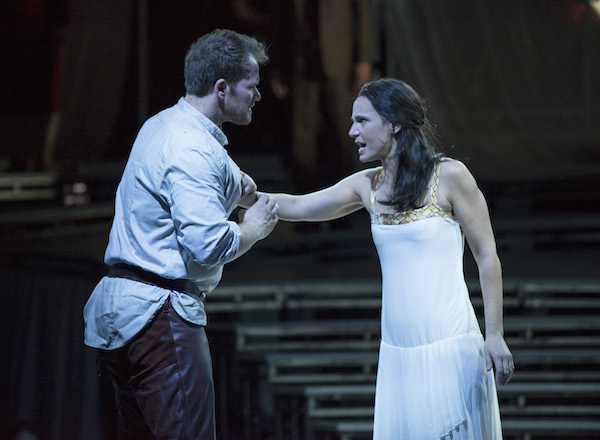No relief in Boston Lyric Opera’s gripping “Rape of Lucretia”
The ending of Benjamin Britten’s The Rape of Lucretia seeks peace and resolution in the wake of horrific events. But Boston Lyric Opera’s vivid and economical new production of the work, which opened at the Artists for Humanity EpiCenter Monday night, leaves its harrowing story unresolved despite the composer’s call for forgiveness and hope.
Adapted by Robert Duncan from André Obey’s Le Viol de Lucrece, Britten’s opera focuses upon Tarquinius, the debauched Etruscan prince of Rome. While drinking with his generals one night, he hears that many of his soldiers’ wives have been unfaithful. Only Collatinus’ wife Lucretia has remained chaste. Goaded by Junius, who believes all women to be whores, Tarquinius rides to Lucretia’s home during the night and assaults her. Feeling shame in the aftermath of the encounter, Lucretia commits suicide, though her death will ultimately oust Tarquinius from the throne.
Though a timely fit for the #MeToo era, Duncan’s slick, troubling story has one significant flaw. Throughout the opera, an unnamed male singer frames Tarquinius’ dastardly deeds as the antithesis of Christian morality. Britten no doubt believed that these lines offer solace in the face of unpleasant things, but they often come off today as contrived and anachronistic.
Without being overly preachy, Sarna Lapine’s powerful new production draws attention to the frequent contradictions between male and female reactions to sexual violence. As the male seeks consolation through faith at opera’s end, an unnamed female singer remains fixed upon Lucretia’s corpse. Such a tragedy, her intense gaze and body language seem to say, can never be forgiven.
Lapine’s staging also conveys the opera’s psychological themes with expressive subtlety. The venue, with its amphitheater seating, invites the singers to use the small center stage, floor aisles, and balconies to intimate and engaging effect. The rape scene is suggested more than shown, though the build-up is terrifying—Tarquinius is called upon to grab Lucretia by the throat and even threaten her with a knife.
Mikiko Suzuki MacAdams’ minimalist sets— a table and moveable platform—were just enough to transform the space into a bedroom and garden. Brown jackets and pants for the bare-chested soldiers and bright dresses for Lucretia and her servants added a splash of earth colors to each scene.
Britten’s angular, even astringent music suits this bleak story, but a cast of fine singers brought out its underlying lyricism and vitality.
Kelley O’Connor sang with a dark, resonant mezzo-soprano, making Lucretia’s plight gripping. When she pined for Collatinus in Act 1, her lines swelled with palpable sadness. After the rape, her performance became more focused, Lucretia’s shame and ultimate death the heartbreaking result of being at the wrong place at the wrong time.
As Tarquinius, Duncan Rock struck a menacing vocal and physical presence, finding both the one-dimensional character’s privileged arrogance and creepy, unquenchable sexual desire. Rock’s Act 2 aria proved the highlight of his performance, his rich baritone capturing the feelings of a man tortured by lust.
Bass-baritone Brandon Cedel sang the role of Collatinus with a cavernous voice. Yet he proved a tender and comforting presence to O’Connor’s Lucretia when he learns of her rape, his smooth lines imbued with affection, grief, and understanding. Sung with conviction by David McFerrin, Junius cunningly egged on Tarquinius’ sexual conquests and, in a twist, called for him to be overthrown for his actions by opera’s end.
As Lucretia’s servants Bianca and Lucia, Margaret Lattimore and Sara Womble respectively sang with warmth and clarity. In the scene where the women fold linen, Womble’s soprano floated gracefully over Lattimore’s butter-toned phrases. Both brought sweet innocence to the garden scene in Act 2.
As the male chorus, Jesse Darden possessed a smooth, creamy tenor that delivered moments of uneasy calm in the face of the disquieting action onstage. Soprano Antonia Tamer sang the role of the female chorus with a vibrancy that effectively expressed righteous anger over Lucretia’s fate.
Led by pianist and conductor David Angus, the chamber ensemble underscored the singer-actors’ dramatic tensions with urgency. The music of the garden scene flowered beautifully, and the surging chromatic strains captured the shock of a rape scene that was left to play out in the mind’s eye. The last phrases, with their spare dissonances, unsettled Britten’s Christian message. Forgiveness may be divine, the music suggests, but the way forward will be anything but easy.
The Rape of Lucretia runs through Sunday at the Artists for Humanity EpiCenter. blo.org
Posted in Performances

Posted Mar 15, 2019 at 3:50 pm by left me
I disliked it. The performers were excellent, but the opera itself left me feeling most dissatisfied. It stretched out a very short occurrence to fill what the Composer hoped would be a satisfactory evening. Then to fill in the allotted time, it ended with a great deal of philosophizing by the male and female “choruses” about the wonderful events to come in seven hundred years. Not my idea of successful operatic writing!